Applied Ethical Theory Essay: Kantianism Applied to Ethics
VerifiedAdded on 2020/05/16
|5
|1083
|195
Essay
AI Summary
This essay delves into the realm of applied ethical theory, specifically focusing on the philosophical framework of Kantianism. The core tenets of Kantian ethics, which emphasize the morality of actions based on underlying principles rather than outcomes or emotions, are explored. The essay then applies this framework to analyze three key ethical dilemmas: euthanasia, discrimination, and abortion. Through a critical examination, it argues that based on Kantian principles, these actions are often deemed unjustified because they violate the inherent moral value of individuals and the categorical imperative. The essay highlights the importance of ethical considerations in various aspects of human life and demonstrates how different ethical frameworks can lead to varying conclusions about the morality of specific actions. The conclusion emphasizes the significance of ethical frameworks in understanding human actions.
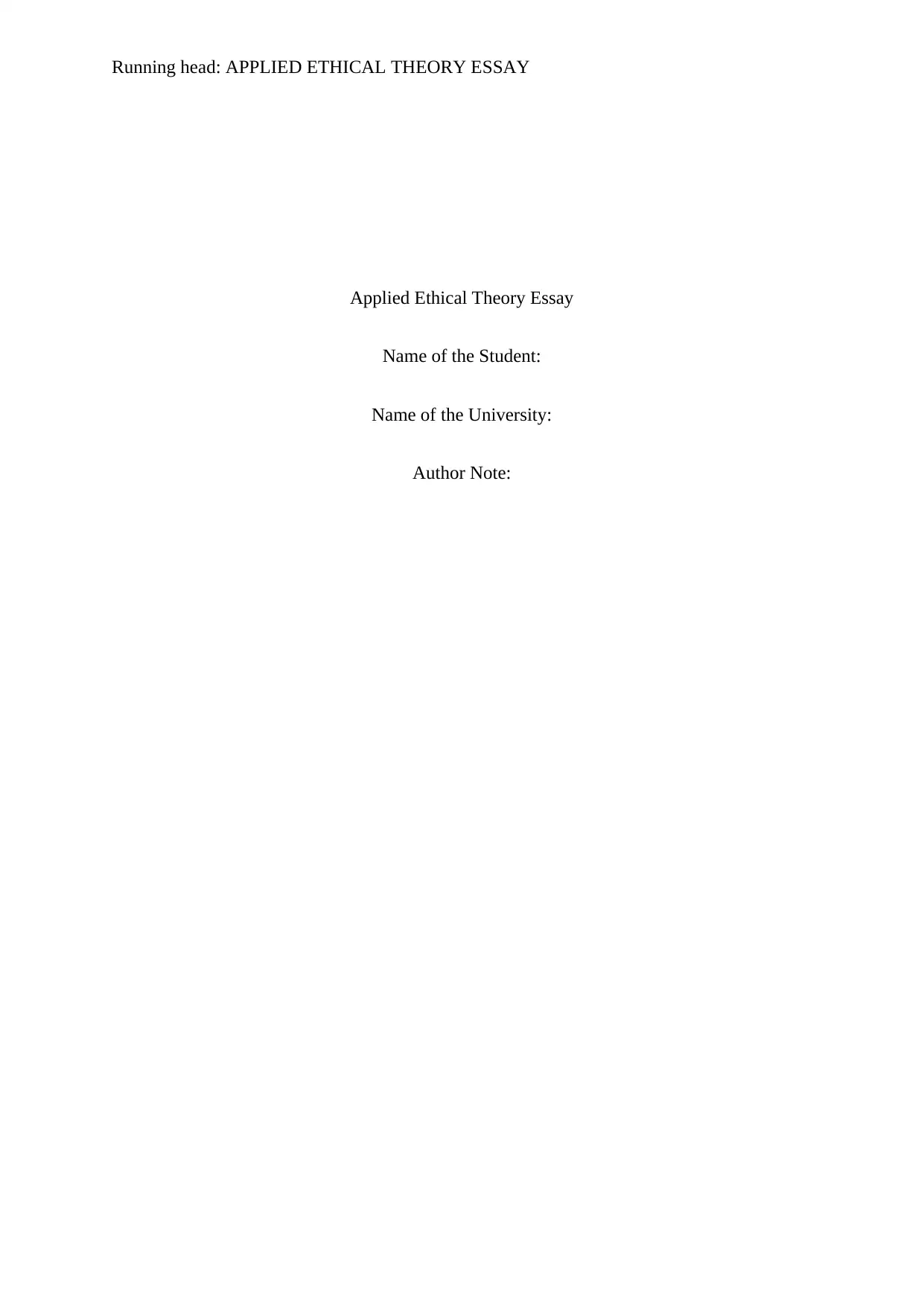
Running head: APPLIED ETHICAL THEORY ESSAY
Applied Ethical Theory Essay
Name of the Student:
Name of the University:
Author Note:
Applied Ethical Theory Essay
Name of the Student:
Name of the University:
Author Note:
Paraphrase This Document
Need a fresh take? Get an instant paraphrase of this document with our AI Paraphraser
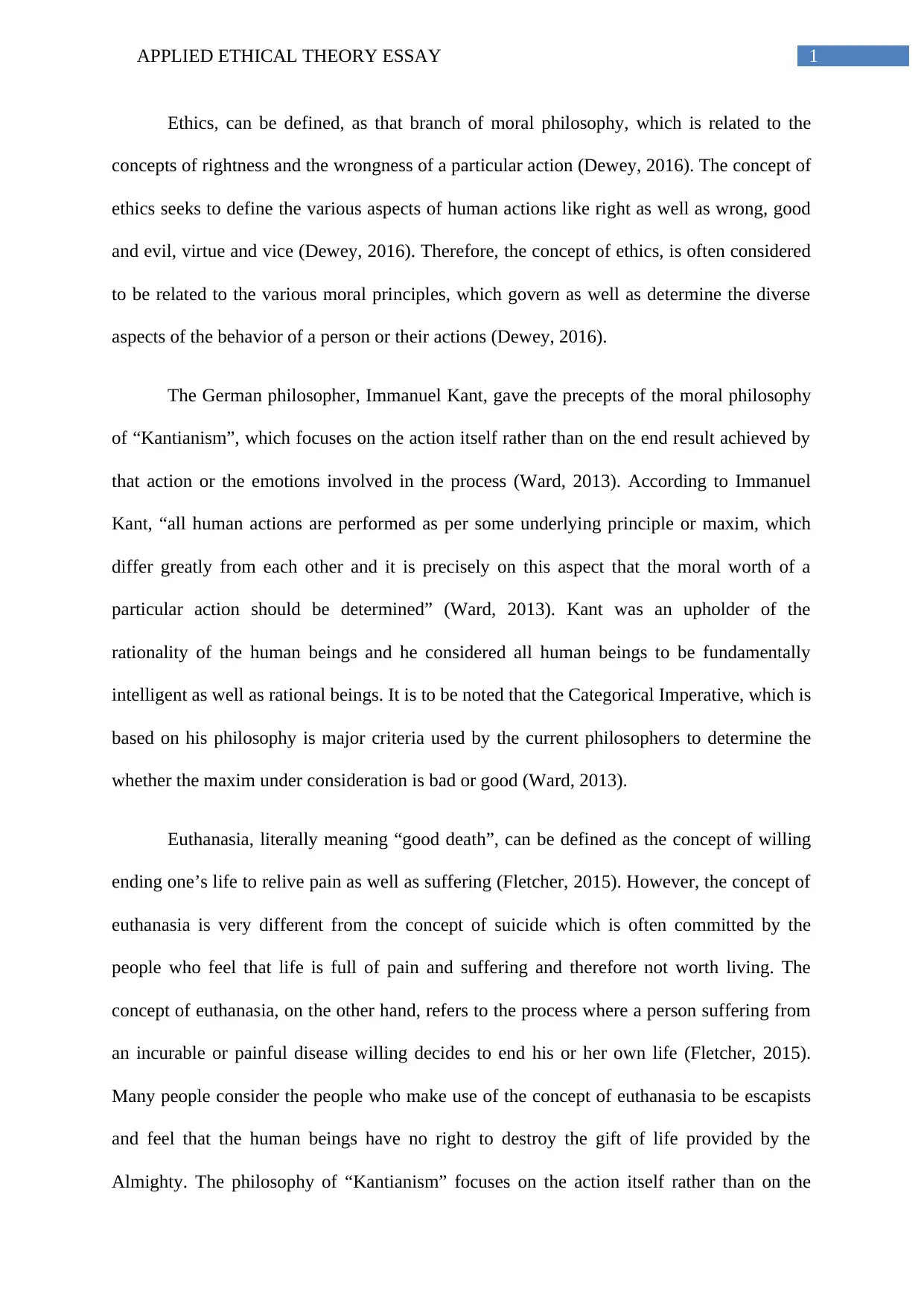
1APPLIED ETHICAL THEORY ESSAY
Ethics, can be defined, as that branch of moral philosophy, which is related to the
concepts of rightness and the wrongness of a particular action (Dewey, 2016). The concept of
ethics seeks to define the various aspects of human actions like right as well as wrong, good
and evil, virtue and vice (Dewey, 2016). Therefore, the concept of ethics, is often considered
to be related to the various moral principles, which govern as well as determine the diverse
aspects of the behavior of a person or their actions (Dewey, 2016).
The German philosopher, Immanuel Kant, gave the precepts of the moral philosophy
of “Kantianism”, which focuses on the action itself rather than on the end result achieved by
that action or the emotions involved in the process (Ward, 2013). According to Immanuel
Kant, “all human actions are performed as per some underlying principle or maxim, which
differ greatly from each other and it is precisely on this aspect that the moral worth of a
particular action should be determined” (Ward, 2013). Kant was an upholder of the
rationality of the human beings and he considered all human beings to be fundamentally
intelligent as well as rational beings. It is to be noted that the Categorical Imperative, which is
based on his philosophy is major criteria used by the current philosophers to determine the
whether the maxim under consideration is bad or good (Ward, 2013).
Euthanasia, literally meaning “good death”, can be defined as the concept of willing
ending one’s life to relive pain as well as suffering (Fletcher, 2015). However, the concept of
euthanasia is very different from the concept of suicide which is often committed by the
people who feel that life is full of pain and suffering and therefore not worth living. The
concept of euthanasia, on the other hand, refers to the process where a person suffering from
an incurable or painful disease willing decides to end his or her own life (Fletcher, 2015).
Many people consider the people who make use of the concept of euthanasia to be escapists
and feel that the human beings have no right to destroy the gift of life provided by the
Almighty. The philosophy of “Kantianism” focuses on the action itself rather than on the
Ethics, can be defined, as that branch of moral philosophy, which is related to the
concepts of rightness and the wrongness of a particular action (Dewey, 2016). The concept of
ethics seeks to define the various aspects of human actions like right as well as wrong, good
and evil, virtue and vice (Dewey, 2016). Therefore, the concept of ethics, is often considered
to be related to the various moral principles, which govern as well as determine the diverse
aspects of the behavior of a person or their actions (Dewey, 2016).
The German philosopher, Immanuel Kant, gave the precepts of the moral philosophy
of “Kantianism”, which focuses on the action itself rather than on the end result achieved by
that action or the emotions involved in the process (Ward, 2013). According to Immanuel
Kant, “all human actions are performed as per some underlying principle or maxim, which
differ greatly from each other and it is precisely on this aspect that the moral worth of a
particular action should be determined” (Ward, 2013). Kant was an upholder of the
rationality of the human beings and he considered all human beings to be fundamentally
intelligent as well as rational beings. It is to be noted that the Categorical Imperative, which is
based on his philosophy is major criteria used by the current philosophers to determine the
whether the maxim under consideration is bad or good (Ward, 2013).
Euthanasia, literally meaning “good death”, can be defined as the concept of willing
ending one’s life to relive pain as well as suffering (Fletcher, 2015). However, the concept of
euthanasia is very different from the concept of suicide which is often committed by the
people who feel that life is full of pain and suffering and therefore not worth living. The
concept of euthanasia, on the other hand, refers to the process where a person suffering from
an incurable or painful disease willing decides to end his or her own life (Fletcher, 2015).
Many people consider the people who make use of the concept of euthanasia to be escapists
and feel that the human beings have no right to destroy the gift of life provided by the
Almighty. The philosophy of “Kantianism” focuses on the action itself rather than on the
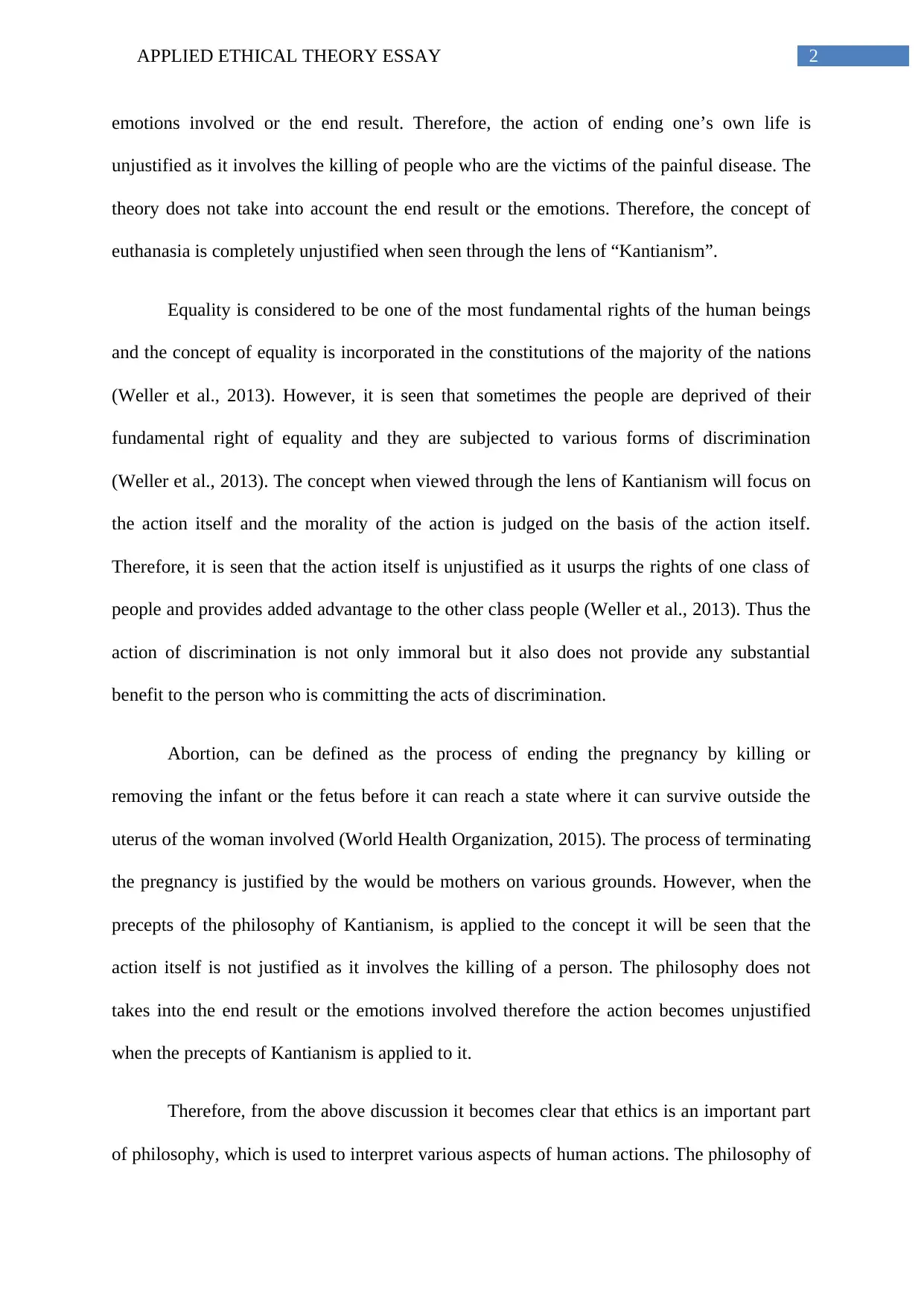
2APPLIED ETHICAL THEORY ESSAY
emotions involved or the end result. Therefore, the action of ending one’s own life is
unjustified as it involves the killing of people who are the victims of the painful disease. The
theory does not take into account the end result or the emotions. Therefore, the concept of
euthanasia is completely unjustified when seen through the lens of “Kantianism”.
Equality is considered to be one of the most fundamental rights of the human beings
and the concept of equality is incorporated in the constitutions of the majority of the nations
(Weller et al., 2013). However, it is seen that sometimes the people are deprived of their
fundamental right of equality and they are subjected to various forms of discrimination
(Weller et al., 2013). The concept when viewed through the lens of Kantianism will focus on
the action itself and the morality of the action is judged on the basis of the action itself.
Therefore, it is seen that the action itself is unjustified as it usurps the rights of one class of
people and provides added advantage to the other class people (Weller et al., 2013). Thus the
action of discrimination is not only immoral but it also does not provide any substantial
benefit to the person who is committing the acts of discrimination.
Abortion, can be defined as the process of ending the pregnancy by killing or
removing the infant or the fetus before it can reach a state where it can survive outside the
uterus of the woman involved (World Health Organization, 2015). The process of terminating
the pregnancy is justified by the would be mothers on various grounds. However, when the
precepts of the philosophy of Kantianism, is applied to the concept it will be seen that the
action itself is not justified as it involves the killing of a person. The philosophy does not
takes into the end result or the emotions involved therefore the action becomes unjustified
when the precepts of Kantianism is applied to it.
Therefore, from the above discussion it becomes clear that ethics is an important part
of philosophy, which is used to interpret various aspects of human actions. The philosophy of
emotions involved or the end result. Therefore, the action of ending one’s own life is
unjustified as it involves the killing of people who are the victims of the painful disease. The
theory does not take into account the end result or the emotions. Therefore, the concept of
euthanasia is completely unjustified when seen through the lens of “Kantianism”.
Equality is considered to be one of the most fundamental rights of the human beings
and the concept of equality is incorporated in the constitutions of the majority of the nations
(Weller et al., 2013). However, it is seen that sometimes the people are deprived of their
fundamental right of equality and they are subjected to various forms of discrimination
(Weller et al., 2013). The concept when viewed through the lens of Kantianism will focus on
the action itself and the morality of the action is judged on the basis of the action itself.
Therefore, it is seen that the action itself is unjustified as it usurps the rights of one class of
people and provides added advantage to the other class people (Weller et al., 2013). Thus the
action of discrimination is not only immoral but it also does not provide any substantial
benefit to the person who is committing the acts of discrimination.
Abortion, can be defined as the process of ending the pregnancy by killing or
removing the infant or the fetus before it can reach a state where it can survive outside the
uterus of the woman involved (World Health Organization, 2015). The process of terminating
the pregnancy is justified by the would be mothers on various grounds. However, when the
precepts of the philosophy of Kantianism, is applied to the concept it will be seen that the
action itself is not justified as it involves the killing of a person. The philosophy does not
takes into the end result or the emotions involved therefore the action becomes unjustified
when the precepts of Kantianism is applied to it.
Therefore, from the above discussion it becomes clear that ethics is an important part
of philosophy, which is used to interpret various aspects of human actions. The philosophy of
⊘ This is a preview!⊘
Do you want full access?
Subscribe today to unlock all pages.

Trusted by 1+ million students worldwide
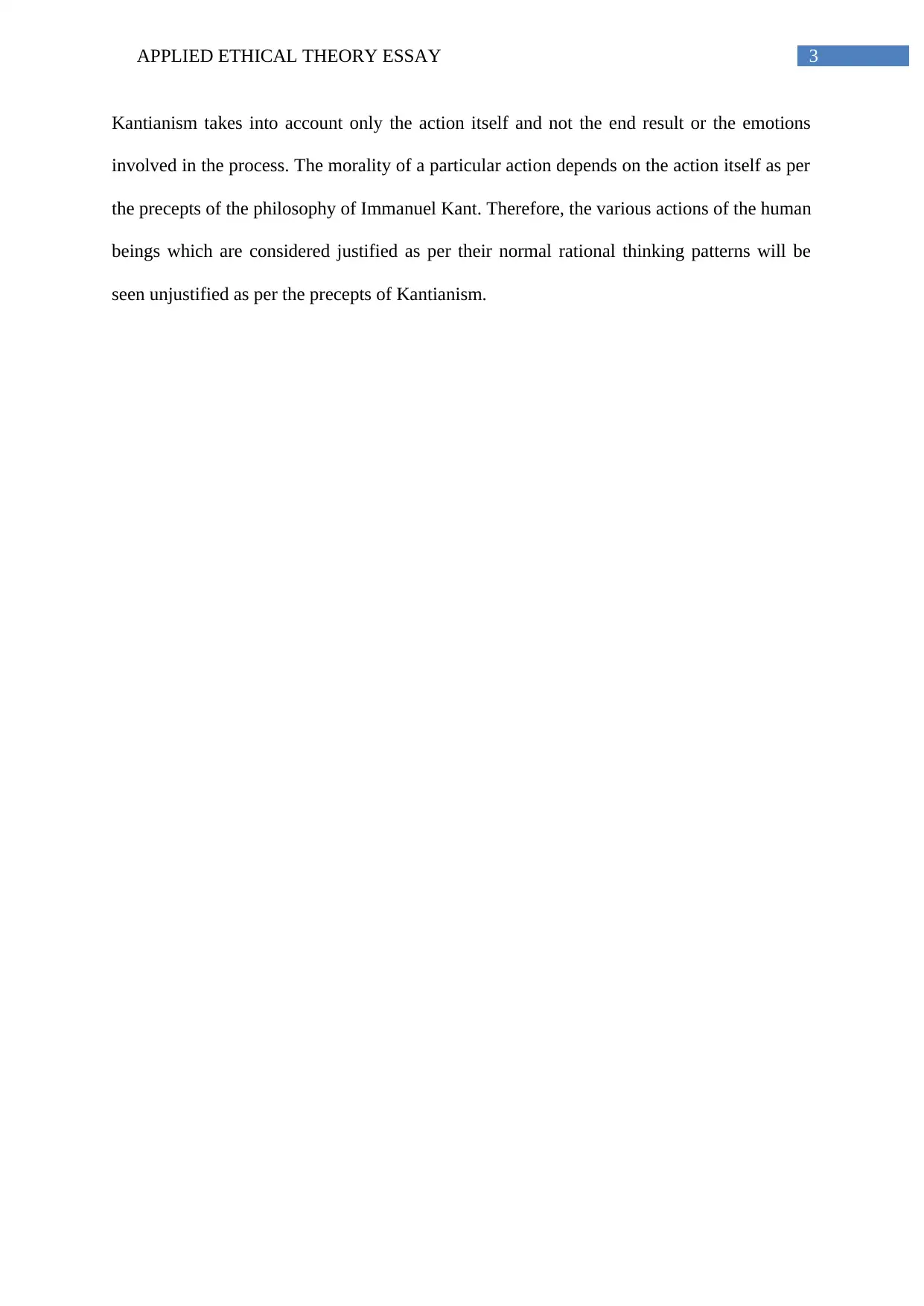
3APPLIED ETHICAL THEORY ESSAY
Kantianism takes into account only the action itself and not the end result or the emotions
involved in the process. The morality of a particular action depends on the action itself as per
the precepts of the philosophy of Immanuel Kant. Therefore, the various actions of the human
beings which are considered justified as per their normal rational thinking patterns will be
seen unjustified as per the precepts of Kantianism.
Kantianism takes into account only the action itself and not the end result or the emotions
involved in the process. The morality of a particular action depends on the action itself as per
the precepts of the philosophy of Immanuel Kant. Therefore, the various actions of the human
beings which are considered justified as per their normal rational thinking patterns will be
seen unjustified as per the precepts of Kantianism.
Paraphrase This Document
Need a fresh take? Get an instant paraphrase of this document with our AI Paraphraser
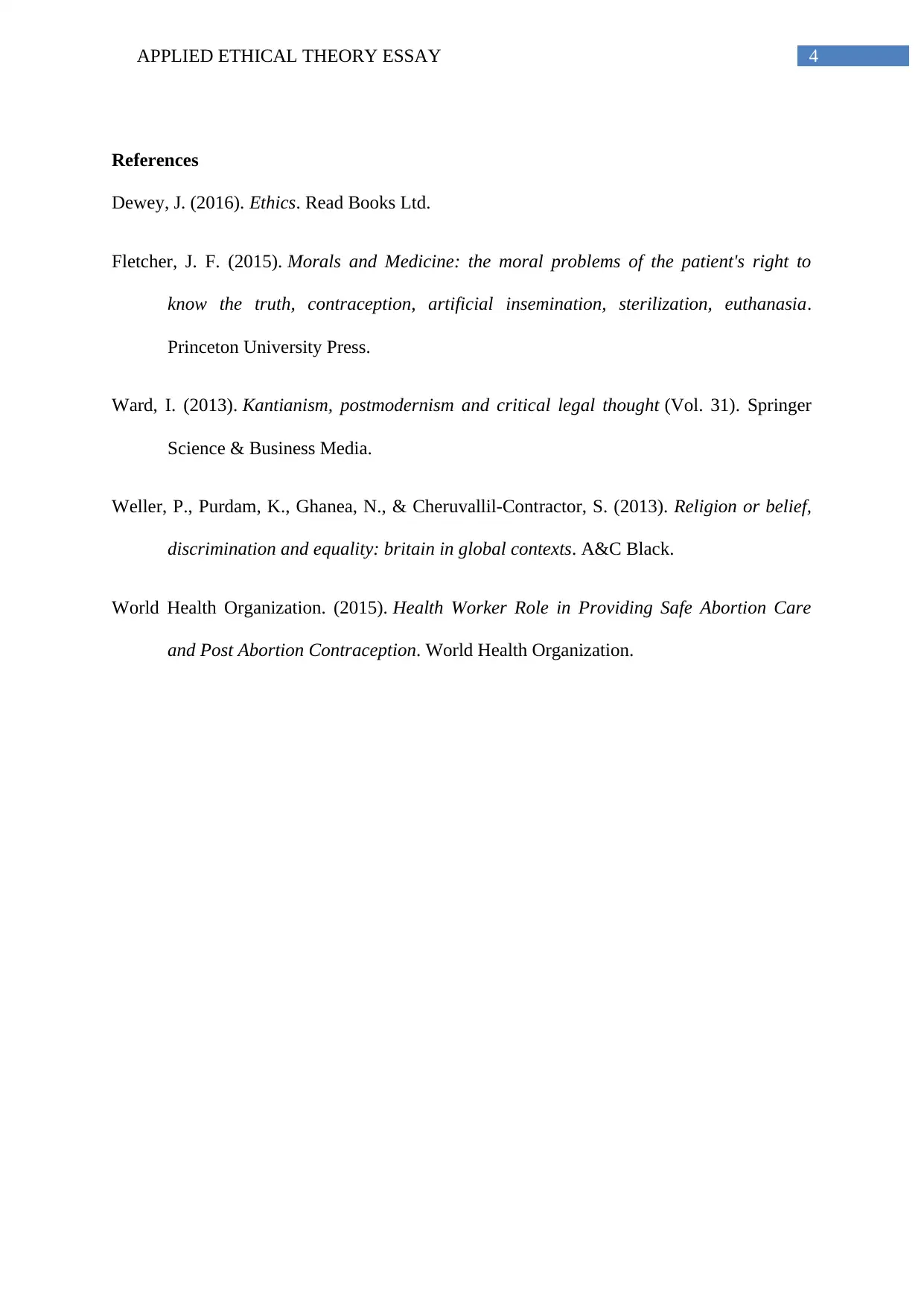
4APPLIED ETHICAL THEORY ESSAY
References
Dewey, J. (2016). Ethics. Read Books Ltd.
Fletcher, J. F. (2015). Morals and Medicine: the moral problems of the patient's right to
know the truth, contraception, artificial insemination, sterilization, euthanasia.
Princeton University Press.
Ward, I. (2013). Kantianism, postmodernism and critical legal thought (Vol. 31). Springer
Science & Business Media.
Weller, P., Purdam, K., Ghanea, N., & Cheruvallil-Contractor, S. (2013). Religion or belief,
discrimination and equality: britain in global contexts. A&C Black.
World Health Organization. (2015). Health Worker Role in Providing Safe Abortion Care
and Post Abortion Contraception. World Health Organization.
References
Dewey, J. (2016). Ethics. Read Books Ltd.
Fletcher, J. F. (2015). Morals and Medicine: the moral problems of the patient's right to
know the truth, contraception, artificial insemination, sterilization, euthanasia.
Princeton University Press.
Ward, I. (2013). Kantianism, postmodernism and critical legal thought (Vol. 31). Springer
Science & Business Media.
Weller, P., Purdam, K., Ghanea, N., & Cheruvallil-Contractor, S. (2013). Religion or belief,
discrimination and equality: britain in global contexts. A&C Black.
World Health Organization. (2015). Health Worker Role in Providing Safe Abortion Care
and Post Abortion Contraception. World Health Organization.
1 out of 5
Related Documents
Your All-in-One AI-Powered Toolkit for Academic Success.
+13062052269
info@desklib.com
Available 24*7 on WhatsApp / Email
![[object Object]](/_next/static/media/star-bottom.7253800d.svg)
Unlock your academic potential
Copyright © 2020–2026 A2Z Services. All Rights Reserved. Developed and managed by ZUCOL.





